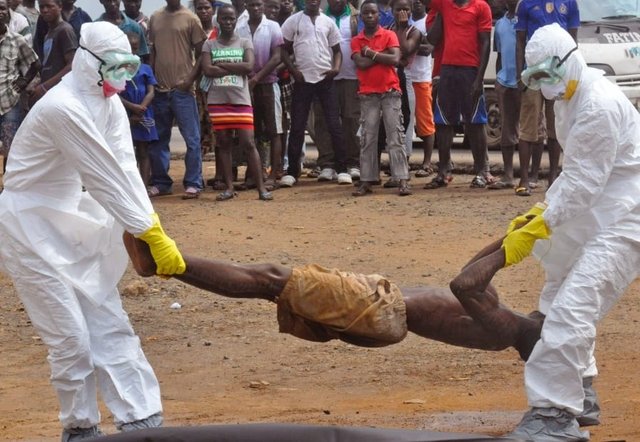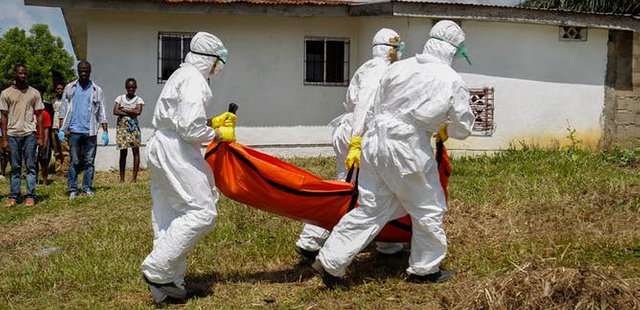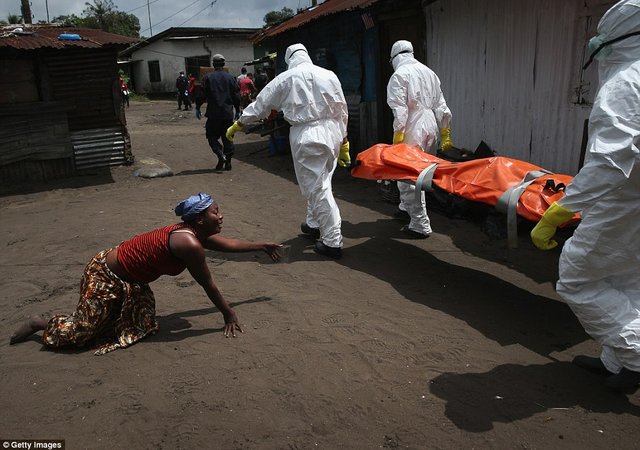Ebola Erupts Again in Africa, Only Now There’s a Vaccine

Ebola has erupted again in the Democratic Republic of Congo, the country’s ninth outbreak since the virus was discovered there in 1976, and world health officials are moving unusually swiftly to contain the outbreak.
Two days after a laboratory confirmed that the virus had killed two people in the remote Equateur Province, teams from the country’s health department, along with doctors from the World Health Organization and Doctors Without Borders, had reached Bikoro, a market town about 20 miles from Ikoko Ipenge, the village at the outbreak’s epicenter.
The teams are expected to have a 15-bed treatment center and a mobile laboratory in place by this weekend, said Dr. Peter Salama, the W.H.O.’s deputy director general for emergency response.
“It’s going to be tough, and it’s going to be costly to stamp this out,” Dr. Salama said at a news conference in Geneva.
ADVERTISEMENT
Health agencies soon plan to deploy a new Ebola vaccine for the first time since it was proved effective two years ago. If it succeeds in halting the outbreak, the vaccine may permanently change the way the world responds to Ebola and greatly lessen the terror surrounding the disease.
Ebola kills about half its victims, often through horrific bleeding from all the body’s orifices. It is thought to circulate in bats, occasionally breaking out to infect people or apes that people sometimes eat. The virus is transmitted in blood, feces and many bodily fluids, and by sex.
You have 3 free articles remaining.
Subscribe to The Times
As of Friday, 32 cases with Ebola symptoms and 18 deaths had been reported; the outbreak was believed to have started in early April.
It was not confirmed as Ebola until Tuesday, when the National Institute for Biomedical Research in the country’s capital, Kinshasa, found the virus in two of five samples taken there for testing.
Bikoro is about 500 miles upriver from Kinshasa, but reaching it by road takes about two days and requires four river crossings by ferry. Its airstrip is too decrepit and overgrown to allow supplies to be flown in, Dr. Salama said.
EDITORS’ PICKS
The Man Who Cracked the Lottery
45 Stories of Sex and Consent on Campus
Their Husbands Abused Them. Shouldn’t Divorce Be Easy?
ADVERTISEMENT
Ikoko Ipenge is three more hours away, over dirt tracks usually traversed only by motorbikes.
As is common in Ebola outbreaks, the disease appeared to be killing medical personnel and people who touch or wash bodies at funerals. At least one nurse was among the dead.
Although the province is remote, the disease could spread. Bikoro is less than three hours by road from Mbandaka, a city of one million people, and it sits on the shores of Lake Tumba, which empties into the Congo River, on the other side of which is the Republic of Congo.
The rapid multiagency reaction is driven in part by memories of 2014, when the Ebola virus appeared in West Africa for the first time.

A sluggish global response and infighting among W.H.O. offices were blamed for the epidemic reaching the capital cities of Guinea, Liberia and Sierra Leone. Ultimately more than 25,000 fell ill and more than 11,000 died.
The W.H.O. released $1 million from its emergency fund this week to fight the new outbreak, and the United Nations contributed $2 million more. The W.H.O. also opened its operations center, making plans to send to the country about 50 epidemiologists, clinicians and experts in logistics, infection control, communications and vaccination.
The W.H.O. will also ship protective gowns, aprons, boots and masks for caregivers, as well as bleach spray, body bags and other equipment.
The Wellcome Trust, Britain’s equivalent of the Bill and Melinda Gates Foundation, has donated $2.7 million to the effort, and the British government’s development agency donated $1.3 million.
ADVERTISEMENT
“We know from previous outbreaks that the D.R.C. is ready to act, but they need global support to ensure this outbreak is contained effectively,” said Dr. Jeremy Farrar, director of the Wellcome Trust.
This outbreak will be the first time a new Ebola vaccine, known as rVSV-ZEBOV, has been rolled out since it was found to be 100 percent effective in field tests in Guinea in 2016, said Dr. Seth F. Berkley, chief executive of Gavi, the Vaccine Alliance.
Gavi agreed to pay for the creation ofan emergency stockpile of 300,000 doses. At the moment, he said, they are stored at minus 80 degrees by the manufacturer, Merck, Sharpe & Dohme.
Because the vaccine is still unlicensed, the W.H.O. will have to approve releasing it for emergency use or the Congolese government will have to officially declare its use as part of a clinical trial, probably run by Doctors Without Borders, Dr. Berkley explained.
“The country is requesting it, and the response is underway,” he said Friday.
The vaccine must be kept cold, but it is packed in liquid-nitrogen-cooled containers meant to withstand days of transit over rough roads in hot weather, he said.
There was another Ebola outbreak in the D.R.C. last year, also in a remote area, the province of Bas-Uélé. But before the vaccine could be rolled out, the virus was stopped by methods used in earlier outbreaks — health workers in protective gear isolating the sick and burying the dead.
Ultimately only eight infections were confirmed, and four of the victims died.

The rVSV-ZEBOV vaccine was in development for many years before the 2014 outbreak, but no one paid for clinical trials to prove it worked. The trial that proved it effective was organized only in that epidemic’s waning days, when there were just a few cases.
Several other vaccines are also in development, including candidates from Johnson & Johnson, GSK, Russia and China. May God see them through.Amen